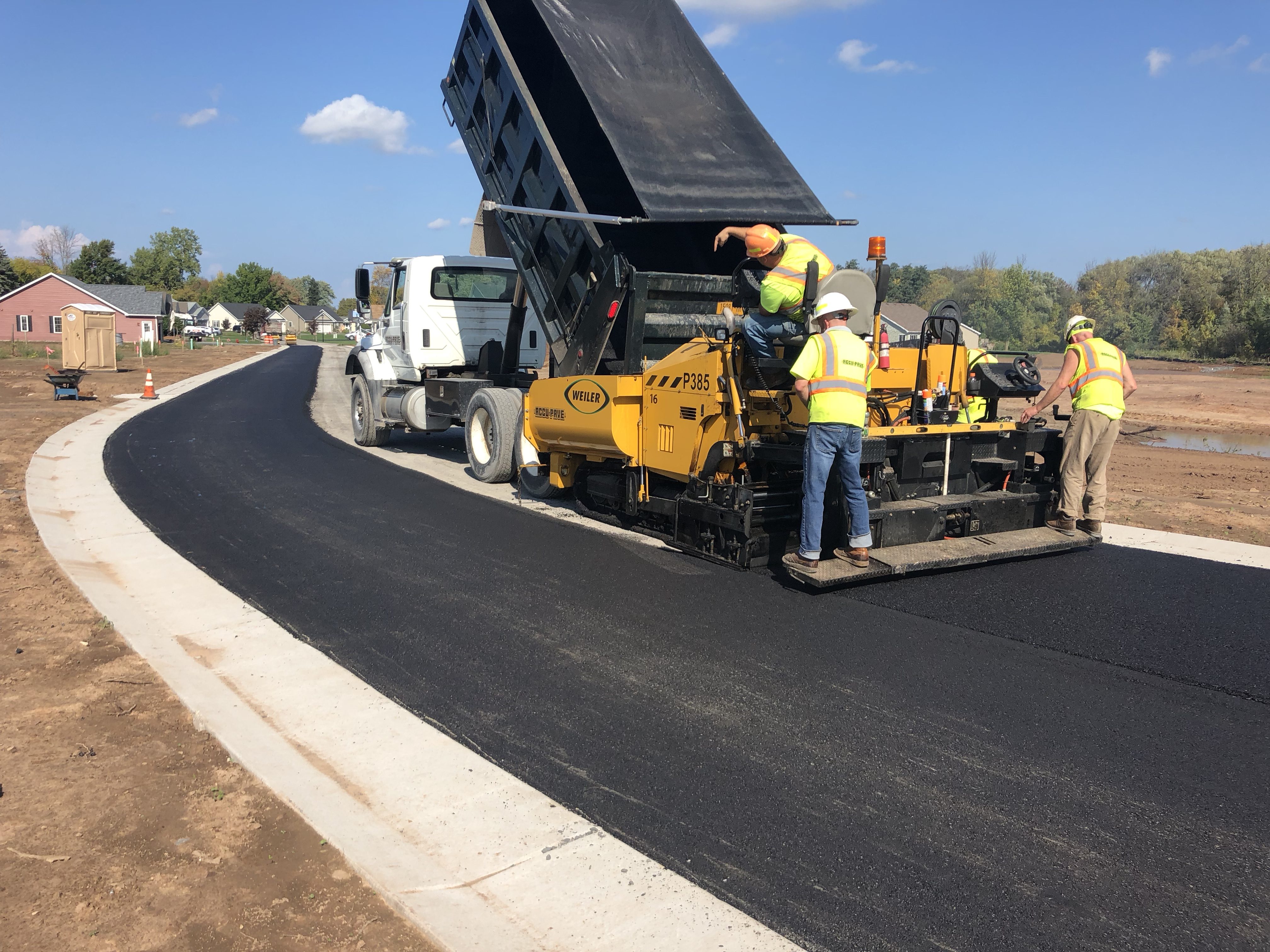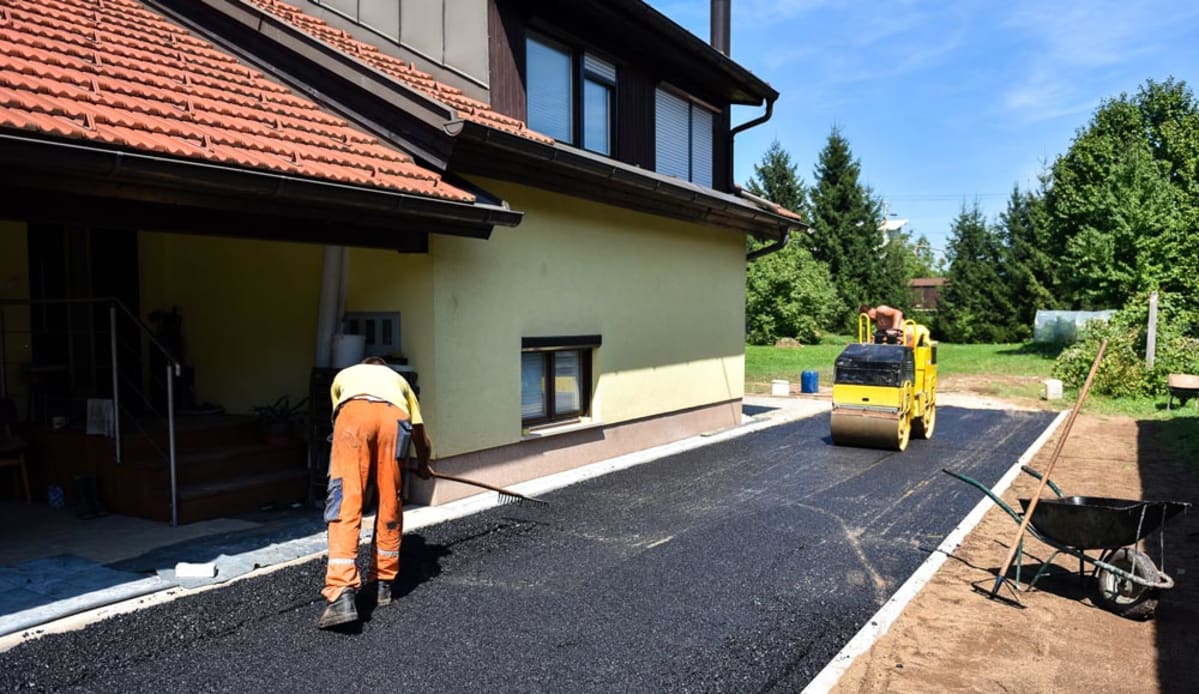Comprehending the Various Sorts Of Asphalt Paving Available Today
In the world of building and construction and facilities, a detailed understanding of the various kinds of asphalt paving is important for optimum task end results. From the robust Warm Mix Asphalt, created for high-traffic areas, to the ecologically mindful Porous Asphalt that facilitates water administration, each type presents distinctive benefits customized to certain needs.

Hot Mix Asphalt
What makes warm mix asphalt a preferred selection for roadway building and repairs? Warm mix asphalt (HMA) is preferred for its sturdiness, versatility, and efficiency under differing conditions. Made up of a mix of accumulations and fluid asphalt concrete, HMA is created at high temperature levels, generally in between 300 ° F and 350 ° F (asphalt paving acworth ga). This high-temperature application enables for optimum bonding and compaction, causing a smooth, resistant surface that can stand up to rush hour loads and negative weather.
HMA's capability to be tailored to details project demands is an additional significant advantage. Various gradations and formulations can be used to improve buildings such as versatility, resistance to contortion, and long life. Additionally, hot mix asphalt can be swiftly set up and available to traffic, decreasing interruption during construction.
Environmental considerations also play a role in the choice for HMA. The product is recyclable, and recovered asphalt pavement (RAP) can be reused, promoting sustainability in road building techniques. In general, hot mix asphalt sticks out as a trustworthy option, effectively providing a resilient, high-performance surface area that fulfills the demands of modern-day framework.
Cold Mix Asphalt
Cold mix asphalt is a flexible option to hot mix asphalt, particularly suited for specific applications such as patching and surface treatments. This sort of asphalt is generated at ambient temperatures, enabling much easier handling and application without the demand for substantial heating equipment.
Generally made up of asphalt solutions or lowerings, chilly mix asphalt can be combined on-site or acquired pre-mixed. Its residential properties enable it to bind well with existing sidewalk, making it an effective solution for fixing craters, splits, and various other surface issues. Additionally, it can be used in a variety of weather, offering a practical alternative for year-round maintenance.

However, while chilly mix asphalt is ideal for momentary repairs, it may not give the same longevity or resilience as hot mix asphalt under rush hour problems. It is best utilized for low-traffic locations or as a short-term solution until more irreversible repair work can be performed.
Cozy Mix Asphalt
While warm mix asphalt has long been the criterion for roadway building and construction, warm mix asphalt (WMA) has become an ingenious option that stabilizes efficiency with ecological factors to consider. WMA is generated at dramatically reduced temperatures-- usually in between 215 ° F and 275 ° F-- compared to warm mix asphalt, which is heated up to around 300 ° F. This reduction in temperature level not just decreases energy consumption but additionally lowers greenhouse gas discharges throughout production.
The modern technology behind WMA entails the use of additives or methods that make it possible for far better workability at reduced temperature levels. These can include chemical ingredients, lathering procedures, or a combination of both. Because of this, WMA maintains the essential buildings for toughness and efficiency while providing a much more environmentally friendly alternative.

Porous Asphalt
Permeable asphalt stands for a forward-thinking approach in pavement layout, focusing on both performance and ecological sustainability. This cutting-edge material is specifically crafted to enable water to permeate with its surface area, effectively minimizing drainage and promoting groundwater recharge. As an outcome, porous asphalt is a superb choice for areas prone to flooding or where stormwater management is crucial.
The structure of porous asphalt differs from traditional asphalt, featuring a higher percentage of spaces that promote drain. This residential or commercial property not only decreases surface water buildup but additionally assists reduce problems like hydroplaning and enhances vehicle traction during wet conditions. click here to find out more asphalt paving acworth ga. In addition, porous asphalt can contribute to metropolitan warm island reduction, as it permits better dissipation and cooling results in city atmospheres
In regards to setup, porous asphalt requires mindful consideration of underlying drain systems to make certain optimum sites performance. Maintenance normally entails normal evaluations and cleaning to prevent blocking from particles, which can harm its leaks in the structure. Generally, permeable asphalt functions as a lasting paving service that aligns with modern ecological objectives, making it a progressively preferred selection for both personal and public tasks.
Rubberized Asphalt
Rubberized asphalt is an advanced paving product that incorporates recycled rubber, commonly sourced from scrap tires, right into the asphalt mix. This cutting-edge approach not only improves the performance of conventional asphalt however likewise promotes environmental sustainability by recycling waste products. The addition of rubber boosts the versatility and toughness of the sidewalk, making it immune to splitting and contortion under differing temperature problems.
Among the substantial advantages best site of rubberized asphalt is its capacity to lower environmental pollution. The rubber particles absorb sound, causing quieter streets, which is specifically beneficial in metropolitan locations. Additionally, this type of asphalt gives boosted skid resistance, improving security for automobiles.
Rubberized asphalt also adds to prolonging the life expectancy of roadway surfaces, leading to lowered upkeep costs over time. This durability is particularly important for high-traffic areas where deterioration are accelerated. Furthermore, its resistance to moisture penetration helps reduce the threat of water damage, further improving sturdiness.
Conclusion
In recap, the range of asphalt paving types-- Warm Mix Asphalt, Cold Mix Asphalt, Warm Mix Asphalt, Porous Asphalt, and Rubberized Asphalt-- each satisfy unique features that deal with diverse building and construction and maintenance needs. These choices not just enhance road quality but additionally add to sustainability via minimized power intake and enhanced water management. Recognizing these differences is crucial for picking the appropriate asphalt kind, inevitably making sure reliable and reliable leading solutions in different settings.
From the robust Hot Mix Asphalt, developed for high-traffic areas, to the eco aware Porous Asphalt that helps with water monitoring, each kind provides distinctive benefits tailored to details requirements.Usually made up of asphalt solutions or cutbacks, chilly mix asphalt can be mixed on-site or purchased pre-mixed.While hot mix asphalt has actually long been the standard for roadway construction, cozy mix asphalt (WMA) has actually arised as an ingenious alternative that balances efficiency with environmental considerations.Rubberized asphalt is an advanced paving material that integrates recycled rubber, usually sourced from scrap tires, right into the asphalt mix.In recap, the range of asphalt paving types-- Warm Mix Asphalt, Cold Mix Asphalt, Cozy Mix Asphalt, Porous Asphalt, and Rubberized Asphalt-- each accomplish distinctive features that cater to diverse building and construction and maintenance needs.